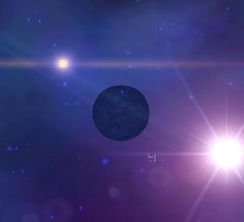
|
This wiki is closed in favour of the new wiki. Information shown is likely to be very out of date. |
Planet Hiura
Error creating thumbnail: Unable to save thumbnail to destination
|
This page has been retired but kept for historical or other reasons, The information on this page may be incorrect, out of date or just not relevant to this version of Discovery. It should not be taken as canon nor any authority on the current version of Discovery. It is kept simply to show some history of the Discovery Mod:
See also:
|
| Planet Hiura | |
| Location | 6C, Tau-65 Edge Worlds |
| Technical information | |
| Docking | No |
| Terrain | unknown |
| Diameter | unknown |
| Mass | unknown |
| Temperature | unknown |
| Escape velocity | unknown |
Surveyed in late 655 A.S., Hiura is a small rocky moon covered in a deep layer of ice. Despite its relatively small size, deep scans have revealed the moon to be primarily composed of silicate rock with a dense iron core. The resulting mass has enabled Hiura to retain a thin atmosphere composed mainly of Oxygen, although it is still not breathable by humans. Several probes have examined the moon in greater detail over the years, but a lack of any appreciable resources has precluded any mining development.
In addition to a thin atmosphere Hiura also sports several rings, composed mainly of dust particles and ice crystals. At certain periods during its orbit of the stars, the light from both stars catch the rings at such an angle that the rings shimmer in every colour of the light spectrum. If it weren't for the highly secretive nature of the system and presence of the Golden Chrysanthemums, Hiura would likely be a popular tourist destination. Even so, many within the Blood Dragons and the Golden Chrysanthemums visit the nearby Morioka Base to catch a glimpse of the spectacular view that the planetoid offers.
